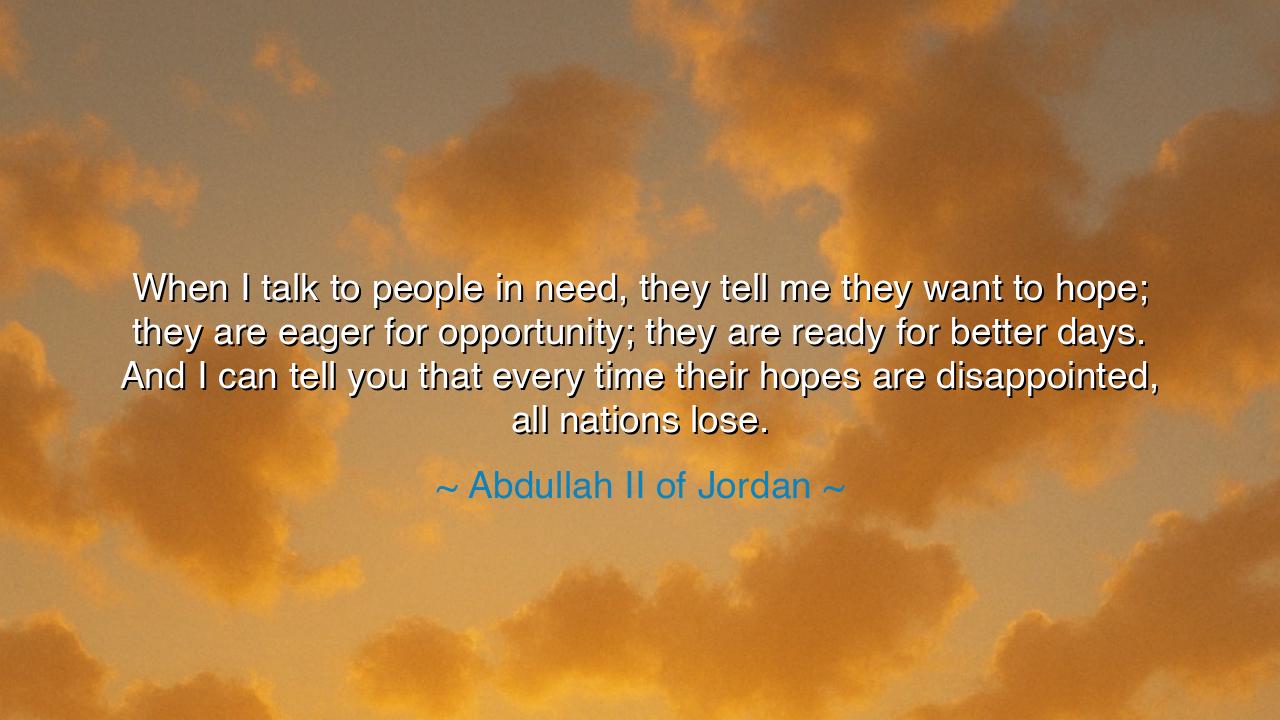
When I talk to people in need, they tell me they want to hope;
When I talk to people in need, they tell me they want to hope; they are eager for opportunity; they are ready for better days. And I can tell you that every time their hopes are disappointed, all nations lose.






“When I talk to people in need, they tell me they want to hope; they are eager for opportunity; they are ready for better days. And I can tell you that every time their hopes are disappointed, all nations lose.” — thus spoke Abdullah II of Jordan, a king whose voice carries not only the weight of his throne, but the burden of his people’s dreams. In this solemn truth, he reminds us that hope is not a private luxury; it is the lifeblood of civilizations. When it withers, it is not one man or one family that suffers, but the soul of humanity itself.
In these words, the King speaks as both ruler and witness. He has seen the eyes of the poor, the displaced, and the forgotten, and he has heard from their lips not cries for wealth, nor demands for vengeance, but something far purer — the yearning for opportunity, for the simple dignity of hope. For when a man can hope, he can endure almost anything. But when hope is denied, the heart becomes a desert where nothing good can grow. Abdullah’s warning is ancient: if the powerful allow the hopes of the weak to die, then no nation — no matter how mighty — can truly prosper.
The origin of this wisdom lies in the soil of the Middle East itself, a land both blessed and burdened with history. There, among the ruins of empires and the cries of exiles, rulers have long learned that the stability of kingdoms is not guarded by armies alone, but by the faith of the people. Abdullah II, whose own nation has sheltered the displaced and endured the storms of war, understands this with a depth few others can. His words are not the rhetoric of a statesman — they are the lament of a shepherd who knows that if one sheep loses its way, the whole flock is endangered. For every disappointed hope, he says, weakens the unseen threads that bind nations together.
Let us recall the fall of Rome, that mighty empire whose marble pillars once touched the heavens. It was not the sword of the barbarian that first brought it low, but the rot within — the decay of compassion, the loss of faith between ruler and ruled. The hungry starved, the poor were mocked, and the powerful drowned in their indulgence. The people’s hope died long before their walls fell. And when the last cry of the hopeless rose over the crumbling city, the whole world lost something — not just an empire, but a vision of greatness turned to dust. So too, Abdullah’s warning reaches across time: every disappointed hope is a crack in the foundation of humanity’s shared house.
For hope is the breath of nations. It is what drives the farmer to till the barren soil, what gives the mother strength to endure hunger so her children may eat, what inspires the teacher to guide minds through darkness. When this sacred flame is snuffed out, when people begin to believe that tomorrow will be no better than today, then civilization itself begins to decay. No wall, no weapon, no wealth can save a nation whose people have ceased to believe in better days. To keep hope alive, therefore, is not sentiment — it is survival.
Yet the King’s words also hold a call to action — for opportunity is the vessel through which hope must travel. It is not enough to speak kindly to the poor or to admire their endurance. To truly serve them, one must open the gates of education, of work, of justice. The hungry cannot eat words, nor can the oppressed live on promises. When hope is met with tangible paths toward change, the spirit of a nation is renewed. But when it is betrayed, it breeds despair — and despair, once seeded, grows into anger that no ruler can control.
Therefore, let the wise and the humble alike heed this teaching: to protect hope in others is to protect the future of all. The leader, the teacher, the citizen — all share this sacred duty. Wherever there is a heart that still dares to dream, it must not be left to die in silence. Every act of fairness, every gesture of compassion, every chance given to one who was forgotten, strengthens the invisible bridge that holds our world together.
So take this lesson and hold it as a covenant: be a keeper of hope. When you see despair, answer it not with pity but with opportunity. When you meet sorrow, give it reason to believe again. For in every life restored, every dream rekindled, the spirit of all nations rises. And as Abdullah II reminds us — when the hopes of the least among us perish, all nations lose; but when those hopes live, the whole world is reborn.






AAdministratorAdministrator
Welcome, honored guests. Please leave a comment, we will respond soon